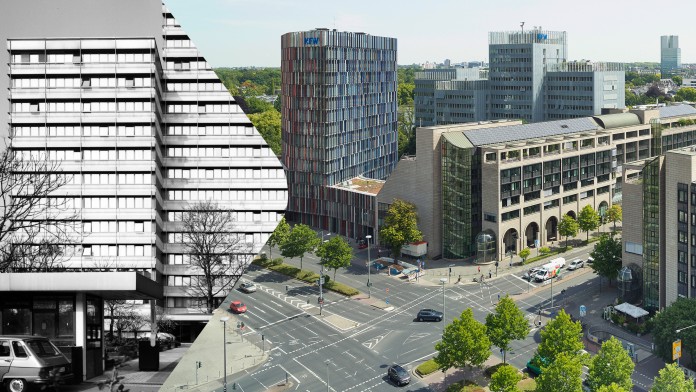Press Release from 2023-11-16 / Group
Celebrating 75 years of being the promotional bank for the Federal Government and the federal states: catalyst for a new era
- On 18 November 1948, the Law Concerning KfW came into force
- Since its foundation, KfW has provided EUR 2.4 trillion in financing
- KfW Group has over 8,000 employees in around 80 locations around the world
- Chief Executive Officer of KfW: “75 years of KfW give us the confidence to continue making a sustainable contribution to transformation in the future.”
“75 years of shaping the future”. This is the motto of KfW’s official celebration of its 75th anniversary. On 18 November 1948, the Law Concerning KfW came into force, laying the foundation for KfW’s evolution into a globally active promotional institution of the German Federal Government, headquartered in Frankfurt am Main and with branches and subsidiaries in Berlin, Bonn, Frankfurt and Cologne, around 80 locations worldwide and more than 8,000 employees.
As a bank committed to responsibility, KfW supports companies, business founders, municipalities and private individuals with long-term, affordable loans, repayment and investment grants. In doing so, it primarily promotes investments in the areas of climate and the environment, digitalisation and innovation, as well as the sovereignty and resilience of the economy and society. Its key activities also include export promotion, the provision of venture capital and financial cooperation with developing countries and emerging economies. KfW has been operating in this area since the late 50s in order to permanently improve the economic and social situation of developing countries. It is involved in a wide range of activities, including energy and water supply, climate action, the development of reliable financial systems, healthcare, education and social security, and conserving natural resources.
In its 75-year history, KfW has made available a promotional business volume of around EUR 2.4 trillion. This corresponds to a good 2% of German economic output over these 75 years, or an average of EUR 430 per capita per year.
KfW now has various subsidiaries with clearly defined mandates, including Cologne-headquartered DEG since 2001. DEG finances and advises companies that invest sustainably and effectively in developing countries. With a portfolio of EUR 9.9 billion invested in around 700 projects in over 80 countries, it is now one of Europe's largest development financiers for the private sector.
Since it was founded in 2008, KfW IPEX-Bank has been the subsidiary responsible for KfW’s export and project financing. It provides financing to support German and European companies on the global markets and supports the economy and society in the transformation process. With a lending volume of over EUR 75 billion, it generates a significant part of KfW’s consolidated net income, therefore contributing to its promotional capacity.
Founded in 2018, KfW Capital invests in German and European VC funds to improve the financing conditions for start-ups and innovative technology companies. KfW Capital has already invested in over 100 VC funds with a volume of more than EUR 1.9 billion – reaching more than 1,900 start-ups. KfW Capital contributes to a sustainable and digital transformation and to the development of a competitive VC ecosystem in Germany.
KfW has played an increasingly important role in mitigating crises in recent years. During the coronavirus pandemic, for example, it supported around 162,000 companies with assistance loans worth over EUR 59 billion on behalf of the German Federal Government and in cooperation with the German banking industry. Following Russia's attack on Ukraine, KfW helped secure the energy supply in Germany last year with financing of EUR 58.3 billion on behalf of the German Federal Government.
A central task of KfW today and in the coming years is to support the economy and society in achieving national and international sustainability goals. The focus here is on achieving Germany’s legally anchored greenhouse gas net zero ambitions by 2045. KfW CEO Stefan Wintels, who joined KfW in October 2021 has therefore declared the years from now to 2030 as the “decade of decision”, during which the course must be set for a liveable and successful future for the next generations. KfW will make an effective contribution to this, but will itself have to become a digital transformation and promotional bank. At the same time, Wintels wants the economy and society to tackle the challenges together:
“The transformation of our economy and society is a task for all of society. It is about accelerating the transition to a sustainable society and strengthening Germany and Europe as a venue for industry and technology. The goal is to ensure a good life for future generations too. We can achieve this with the willingness to support change and take responsibility.”
Wintels is confident that we will succeed:
“KfW is close to the market - and there are clear signs that something is happening. The transformation into a sustainable, competitive and resilient Germany has begun. Germany is reinventing itself once again. Nevertheless, the pressure to take action remains very high. Now it’s a matter of taking action quickly.”
KfW quickly came into being in 1948. Following the adoption of the law in November, KfW was formed on 21 December. The first loan applications were already being evaluated in January 1949. Back in the day, a small group of employees, based near the Frankfurt train station, successfully handled millions. The pragmatic approach was also reflected in the premises: it was only in the mid-60s that all employees moved to their own office building at the current location in Frankfurt Bockenheim.
KfW differs from banks and savings banks in its business model. It does not have any branches, operate any deposit business, or offer any current accounts. In its promotional business, it does therefore not compete with banks and savings banks, but acts as a “bank behind the banks”, i.e. it normally refinances the on-lending credit institutions, which in turn pass on KfW's favourable terms to customers.
In its 75-year history, KfW has emerged as one of the largest capital market players in the world. Thanks to a guarantee from the German Federal Government, it has excellent financial standing and can refinance its needs on very favourable terms on the capital market. Today, it does this almost entirely by issuing bonds on the international capital markets in various currencies and maturities. The total volume of funds raised in this way in the last two years was around EUR 90 billion each year. Green bonds have gained increasing importance in recent years: the funds raised by KfW through green bonds – more than EUR 60 billion since 2014 – are linked to environmental and climate action projects. KfW is also one of the world’s largest issuers in this segment.
Image material for downloading is available in Photo Archive | KfW under KfW-Themen/KfW Historie.
If you have any questions, please e-mail bildredaktion@kfw.de.




Share page
To share the content of this page with your network, click on one of the icons below.
Note on data protection: When you share content, your personal data is transferred to the selected network.
Data protection
Alternatively, you can also copy the short link: https://www.kfw.de/s/enkBbm2w.DAIA
Copy link Link copied